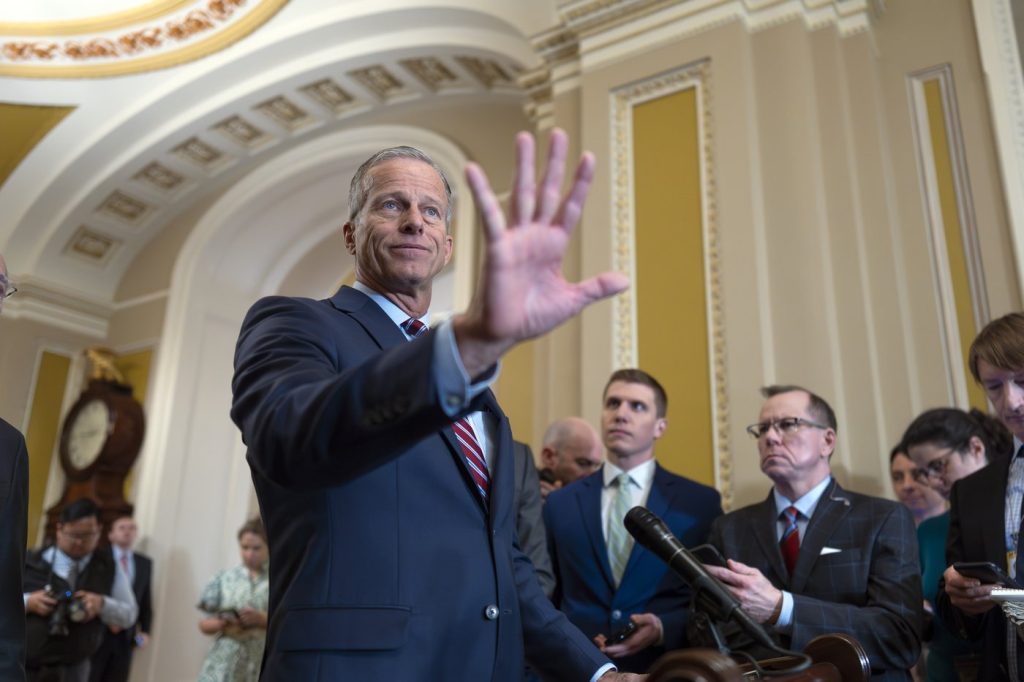On Friday, the Senate faced the looming possibility of a partial government shutdown, as Democrats found themselves weighing two challenging options: either passing a funding bill that grants President Donald Trump significant discretion over spending or allowing the government to lapse. Senate Democratic Leader Chuck Schumer had previously allowed his caucus to express their frustrations regarding the available choices but made it clear before the weekend that he would work to prevent a shutdown. This urgency set the stage for a vote on the continuing resolution (CR) likely to occur later that day.
The procedural vote scheduled for Friday will serve as a critical test to determine if the proposed funding package can garner the requisite 60 votes to advance. A minimum of eight Democrats will need to align with Republicans in order to move the legislation forward, as the bill has faced backlash from party members who see it as a deeply flawed compromise.
Schumer acknowledged the CR's shortcomings but emphasized the dire consequences of a government shutdown, claiming, “While the CR still is very bad, the potential for a shutdown has consequences for America that are much, much worse.” The inability of Congress to pass annual appropriations bills has made it necessary to resort to short-term funding measures, and this current legislation marks the third such extension during the ongoing fiscal year.
This new funding bill is designed to maintain federal government operations through the end of September, reducing non-defense spending by approximately $13 billion from the previous year, while increasing defense spending by roughly $6 billion. These adjustments are relatively minor when considering the overall spending level nearing $1.7 trillion.
The spending bill, which was passed by the Republican-led House on Tuesday, left senators in a position where they had to either accept or reject it. Democratic leaders were pushing for a fourth short-term extension; however, GOP leadership was adamant that this option was off the table. Senate Majority Leader John Thune made a case for blaming Democrats for a potential shutdown while urging them to either support the House bill or face the consequences of government closure.
Progressive groups within the party called for lawmakers to oppose the funding bill vehemently, urging the necessity of halting the status quo while Trump and his allies continue to dismantle critical government programs. Schumer countered these sentiments by arguing that a shutdown would essentially hand Trump the power to determine which government agencies and programs are deemed essential, leading to the furlough of staff without any guarantee of rehiring.
The ongoing debate around the funding bill included serious concerns among Democrats regarding the levels of funding and the power it would confer to the Trump administration. Many viewed the measure as essentially a “blank check” for Trump, as it significantly weakens mandated funding directions that typically guide resource allocation for important national programs.
Notably, the bill’s passage could allow the administration to redirect funds away from initiatives aimed at combating the opioid crisis in favor of mass deportation efforts. Additionally, it permits Trump’s administration to have a determining say over the funding of hundreds of projects under the Army Corps of Engineers—affecting commerce, environmental health, and flood control efforts.
Furthermore, the bill's implications for the District of Columbia were contentious, as it effectively repeals current budget allocations and reverts it back to prior spending levels. This move could force the district, which primarily funds itself, to cut spending by $1.1 billion within a short timeframe. Democrats also expressed strong opposition to the rescinding of approximately $20 billion allocated to the IRS, limiting the agency’s financial resources significantly.
The spending bill currently under consideration is also separate from a forthcoming GOP initiative aimed at extending tax cuts for individuals established during Trump’s presidency. Critics from the Democratic side asserted that both this forthcoming legislation and the CR represent a detrimental strategy aimed at benefiting the wealthy at the expense of the general populace. Senator Bernie Sanders described this two-pronged approach as a “very bad CR,” followed by a reconciliation bill that would adversely impact Americans.
Responding to the Democratic objections, Senator Tom Cotton accused them of hypocrisy, claiming they were prepared to impede government operations while attempting to protect government employees and services. “Democrats are fighting to withhold the paychecks of air traffic controllers, our troops, federal custodial staff,” Cotton remarked during discussions. The day promised to be pivotal for both the Senate and the administration as the implications of funding decisions loom over the federal government's operations.










